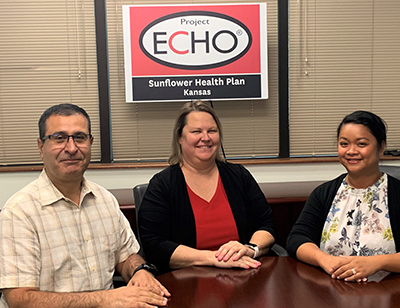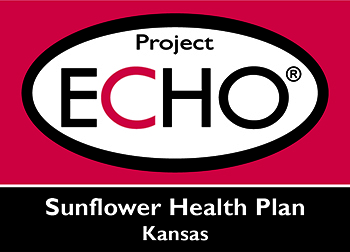Project ECHO Sunflower Health Plan
Collaborative Learning Opportunity with FREE Continuing Education:
About Project ECHO
Project ECHO® (Extension for Community Healthcare Outcomes) is a self-paced lifelong learning and guided practice model that revolutionizes medical education and exponentially increases workforce capacity to provide best-practice specialty care and reduce health disparities.
Project ECHO creates a bridge to allow collaboration and knowledge sharing. The heart of the ECHO model™ is its hub-and-spoke knowledge-sharing networks, led by expert teams who use multi-point videoconferencing, such as Zoom, to conduct virtual clinics with community providers. In this way, primary care doctors, nurses, and other clinicians learn to provide excellent specialty care to patients in their own communities.
The ECHO model is not traditional “telemedicine” where the specialist assumes care of the patient, but is instead tele-mentoring, a guided practice model where the participating clinician retains responsibility for managing the patient.
Project ECHO is not just a learning and mentoring network; it is also a professional community. Participants are encouraged to ask questions, provide input and guidance to one another, and engage actively in discussions, both during and after a session.
For more information please visit the ECHO Institute at the University of New Mexico's Health Science Center.
Four principles comprise the Project ECHO model. The combination of these principles results in a unique and successful approach for improving clinician satisfaction, enhancing clinician knowledge and self-efficacy, and improving patient satisfaction and outcomes:
- Amplification: Use technology to leverage the expertise of a multidisciplinary team.
- Best Practices: Share best practices to reduce disparities and standardize care.
- Case-Based Learning: Leverage case-based learning and guided practice to master complex cases.
- Database: Apply web-based tools to monitor outcomes.
What is a hub?
A regional center where a team of subject matter experts for an ECHO program is located, replicates the ECHO Model™ and runs their own ECHO program. Sunflower Health Plan is a Project ECHO hub.
What is a Case Study?
Project ECHO is a case-based learning option for care providers. A case is an overview of an individual’s medical history and overall health.
How much does it cost to participate?
Participation is free. You generally only need to have standard internet connections and a computer.
Is continuing education available?
Case by case basis depending on the program. This information will be listed for each ECHO series.
How is patient or member information protected?
All the patient/member information presented in a session are de-identified and reviewed before the session. A HIPAA announcement is given prior to the start of each session to remind both specialists and clinicians about the importance of preserving patient confidentiality.
Who should participate?
Individual clinicians of all levels are welcome and highly encouraged to participate in sessions, including physicians, physician assistants, nurse practitioners, registered nurses, psychiatrists, social workers, community health workers and pharmacists. Team participation is encouraged, as team-based care is the ideal model for enabling higher-level care delivery and task shifting.

Sunflower Health Plan Project ECHO Team
Mohamed Radhi, MD; Nan Perrin, PhD, BCBA-D, LBA; Kristine Meier
- Nanette Perrin, PhD, BCBA-D, LBA, Senior Director of LifeShare & Social Determinants of Health
- Mohamed Radhi, MD, Medical Director, Medical Management, Pediatric Hematologist/Oncologist, Pediatric Bone Marrow Transplant
- Ulisa Diane Buckingham, MD, Medical Director, Medical Affairs, Child, Adolescent, & Adult Psychiatrist, Behavioral Health
- Deborah Rear, RN, BSN, MBA, Senior Manager, Case Management
- Kristine Meier, MSEd, BCBA, Transitions of Care Coordinator, Program Manager
- Kelley Hotaling, PharmD, Clinical Pharmacist
- Aaron Dold, PharmD, Clinical Pharmacist
Contact: projectECHO@sunflowerhealthplan.com

Accreditation
SUCCESSFUL COMPLETION: Attend the educational offering, sign-in with full name on Zoom, complete the online evaluation form and verification of attendance.
Joint Accreditation Statement
In support of improving patient care, University of Missouri - Continuing Education for Health Professions is jointly accredited by the Accreditation Council for Continuing Medical Education (ACCME), the Accreditation Council for Pharmacy Education (ACPE), and the American Nurses Credentialing Center (ANCC), to provide continuing education for the healthcare team.
Credit Designation Statements
Physician (AMA PRA Category 1 Credit(s)™
The University of Missouri – Continuing Education for Health Professions designates this educational activity for a maximum of 1.0 AMA PRA Category 1 Credit(s)™. Physicians should only claim the credit commensurate with the extent of their participation in the activity.
Nursing (ANCC Contact Hours)
The University of Missouri – Continuing Education for Health Professions designates this activity for 1.0 ANCC contact hours. Nurses should only claim credit for the actual time spent participating in the activity.
Relevant Financial Relationship Disclosures
The Standards for Integrity and Independence in Accredited Continuing Education state that participants in CE activities should be made aware of any relevant affiliation or financial relationship in the previous 24 months that may affect the planning of an educational activity or a speaker’s presentation(s). Each planning committee member and speaker has been requested to complete a financial relationship reporting form.
No planning committee member or speaker has a relevant financial relationship.
Sunflower Project ECHO: Supports for I/DD
We invite you to attend this series, which will focus on:
- Broadening understanding of the need for a coordinated, collaborative effort to increase accessibility.
- Broadening understanding of resources for lower income, poverty level, or rural populations.
- Understanding how to access support systems and services within the state.
Please plan to attend our Project ECHO sessions on Thursdays, March 5, 12, 19, and 26, 2026, from 12:00-1:00 PM CT via Zoom video conferencing.
Topics include:
- March 5, 2026 – Preventative Health for Women with I/DD – Sara Hart Weir, Whit Downing and Lola Kernell, Kansas Council on Developmental Disabilities
- March 12, 2026 – Oral Health for Individuals with I/DD – MaryAnne Lynch Small, Oral Health KS
- March 19, 2026 – Employment First – Craig Knutson, Kansas Commission on Disability Concerns (KCDC)
- March 26, 2026 – Community Support Waiver – Jessica Schadel and Robin Lohman, KDADS
Dates to vary by speaker availability.
March 5, 2026 - Preventative Health for Women with I/DD - Sara Hart Weir, Allyson McCain, Whit Downing and Lola Kernell, Kansas Council on Developmental Disabilities
Case Study (PDF)
Case Study Recommendations:
March 12, 2026 - Oral Health for Individuals with I/DD – MaryAnne Lynch Small, Oral Health KS
Case Study (PDF)
Case Study Recommendations:
March 19, 2026 – Employment First – Craig Knutson, Kansas Commission on Disability Concerns (KCDC)
Case Study (PDF)
Case Study Recommendations:
March 26, 2026 – Community Support Waiver – Jessica Schadel and Robin Lohman, KDADS
Case Study (PDF)
Case Study Recommendations:
Register for the Sunflower Project ECHO: Closing the Gap: Care Access
Note: After registering you will be given the opportunity to save the series to your calendar of choice. You will also receive an invite via email.
Please do not forward your invite, as it is specific to each person.
To receive clinician continuing education credit from the University of Missouri or certificate of completion from Sunflower Health Plan, each participant must register individually.
Previous Series
Presentations and recommendations for previous Project ECHO sessions can be found on the Project ECHO archive page.

